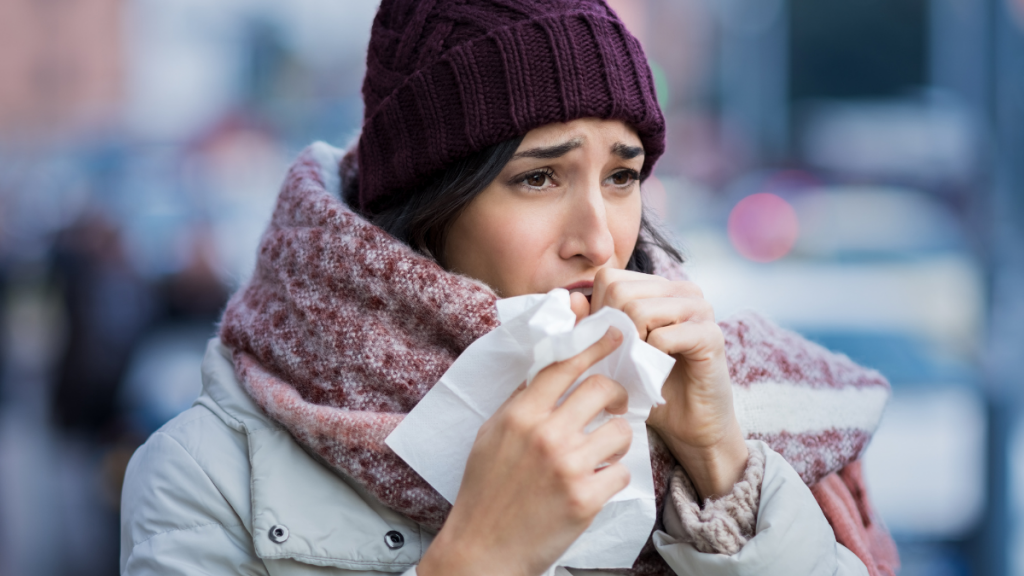Health
See how the cold weather affects your breathing
Cold weather can have a significant impact on your breathing. Learn how cold air can cause respiratory problems and what you can do to stay healthy.
Advertisement
You can spend the colder months healthy with our tips: learn what to do about it!

As the days get colder, you may notice small differences when you breathe. That’s because cold weather affects your breathing.
You might wonder how that happens beyond the obvious sting the cold air brings to your lungs.
In most cases, it’s just a temporary burn that happens while your body adjusts to colder temperatures.
However, for anyone with respiratory or medical lung conditions, the sudden change of hot to cold air can present a bigger risk.
Below, we’ll take a closer look at how the cold weather affects your breathing and what you can do to stay healthy and safe from its complications.

Learn how to prepare your home for winter
Check out this article with all the necessary steps you should take to protect your home from the cold weather and get everything ready before winter comes.
Cold weather means dry air
After months of excruciating heat, the colder air might feel like heaven. Especially for people who like to do outdoor activities. But the cold might affect your breathing.
Cold weather affects your breathing in several ways.
Since cold air is dry air, it can cause the mucous membranes in your nose to become dry and irritated, leading to congestion.
This can make it difficult to breathe and the discomfort may be worse if you have allergies or asthma.
Additionally, the decrease in temperature often means a decrease in humidity levels which can also cause your airways to become dry and uncomfortable.
Even when you’re at home, the heat from your boiler or furnace during the colder months can dry out your sinuses.
That makes it all the easier for any sort of infection to take place. For anyone with lung issues, that can mean shortness of breath, coughing, and wheezing.
Check if you are pre-approved for credit cards and loans with no impact to your credit score
You will be redirected to another website
You’ll receive messages for less than 1 week, with a maximum of 1 message per day. You can unsubscribe anytime by replying STOP. By submitting this form, I confirm that I am 18+ years old and agree to the Privacy Policy and Terms and Conditions. I also provide my signature, giving express consent to receive informational messages via automated emails, SMS, MMS text messages, and other forms of communication. Message frequency may vary as part of our good-faith effort to respond to your inquiry. Message and data rates may apply. Text STOP to cancel. I understand that my consent to receive communications is not a condition of purchase and that I may revoke my consent at any time.
You produce more mucus

As the temperature gets colder, your body produces more mucus to try and protect your lungs from cold air.
While this extra mucus can help protect you from any irritants in the environment, it becomes an issue when it causes difficulty breathing.
Cold air can cause bronchial passages to constrict, making it harder for oxygen to reach your lungs.
This can lead to a feeling of tightness in the chest, wheezing, and coughing.
Flu season makes it all worse
As the cold weather sets in, you may find it more difficult to breathe. This is because cold air is denser than warm air and can constrict your lungs.
For people with preexisting respiratory issues, this can be even more challenging.
And if you happen to catch a virus or flu during this time of year, it can make breathing even more difficult.
The reason why flu spreads more in winter is due to a number of factors.
One of the most important reasons is that people tend to spend more time indoors when it’s cold.
This means they are exposed to each other for longer periods of time and can spread the virus much easier.
Additionally, colder weather tends to dry out our nasal passages and make it easier for the virus to enter our bodies.
Finally, humidity also plays a role in the spread of viruses. Low humidity allows viruses to remain airborne longer, meaning they can be passed from person to person with greater ease.
How to stay healthy during the colder months

As we now know, cold weather really affects our breathing, and it can be especially dangerous for those with respiratory illnesses.
To stay healthy when cold temperatures come around, it’s important to take some precautions. Learn what they are below.
Remember to breathe through your nose
Breathing through your nose during cold weather is much better than breathing through your mouth.
This is because cold air affects your breathing more than warm air. When cold air enters the lungs it causes irritation, making it harder to breathe and increases the risk of infections.
Nasal breathing helps warm and filter cold air before it reaches the lungs, reducing inflammation and supporting healthy respiration.
Wear a mask, or cover your mouth and nose with a scarf
The cold winter months can be especially hard on your respiratory system. The cold air outside can cause your lungs to shrink, making it harder to breathe.
Wearing a mask or covering your mouth and nose with a scarf is an important way to protect yourself.
It helps keep the cold air out and warm air in, while also helping to keep any viruses or germs out of your lungs.
Make sure you’re hydrated
Staying hydrated during cold weather is just as important as staying hydrated in the summertime.
Unfortunately, cold weather affects our breathing and makes it difficult to take deep breaths. That means you may not be getting enough water into your system.
To help combat this effect of cold weather, try drinking plenty of water throughout the day and avoiding drinks that contain caffeine or alcohol, as these can actually dehydrate you.
Additionally, try to avoid cold drinks if possible, as cold drinks may cause your body temperature to drop too low.
Instead, opt for warm beverages such as herbal teas and warm water with lemon.
Good hydration helps keep your lungs and airways healthy during cold weather and can help ease cold and flu symptoms.
Invest in a humidifier
During cold months, the air is drier than usual. This affects your breathing and skin, and can also make it harder to sleep.
A humidifier can help you stay healthy by adding moisture into the air in your home.
By increasing the humidity levels in your space, you’ll find that cold weather related issues like dry skin, dry throat and sinus congestion are minimized.
The use of a humidifier also helps to reduce colds and the flu by increasing your resistance to germs.
Humidifiers come in different sizes, so you can find one that fits your space.
Whether it’s cold outside or cold indoors, using a humidifier is an easy way to stay healthy.
How to boost your immune system to stay healthy
Knowing how the cold weather affects your breathing is important, but so is preparing your immune system for colder months.
If you want to learn how to increase your immune system and avoid diseases, make sure to follow the link below for some useful tips!

How to boost your immune system to stay healthy
Find out how to optimize your immune system and make it stronger. Discover more about the ways you can boost your body's ability to fight off infections and more.
Trending Topics

Common skin care mistakes you need to stop making
Find out the most common skin care mistakes that people make and how you can avoid them yourself for healthier and younger skin.
Keep Reading
How to turn off a fire alarm. Take control with these easy steps!
Find out what you can do if you set off your home's smoke detector, and how to turn off your fire alarm - but just when it's safe to do it!
Keep Reading
Apple is raising prices on all its subscription services
Apple is currently raising prices on a number of subscription services to cover licensing costs. Read on to learn what this means for you!
Keep ReadingYou may also like
The News Stacker recommendation – United Quest℠ Card
Get rewarded for your travel experiences with the United Quest℠ Card! Find out how you can maximize your mileage today!
Keep Reading
Online shopping: 6 top tips
Get the most out of your online shopping experience with these tips! From finding the best deals to avoiding scams, we've got you covered.
Keep Reading
Bank of Queensland Low Rate Credit Card review
Find out how you can save money with the Bank of Queensland Low Rate Credit Card. Get all your questions answered in our review!
Keep Reading